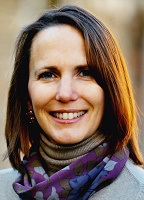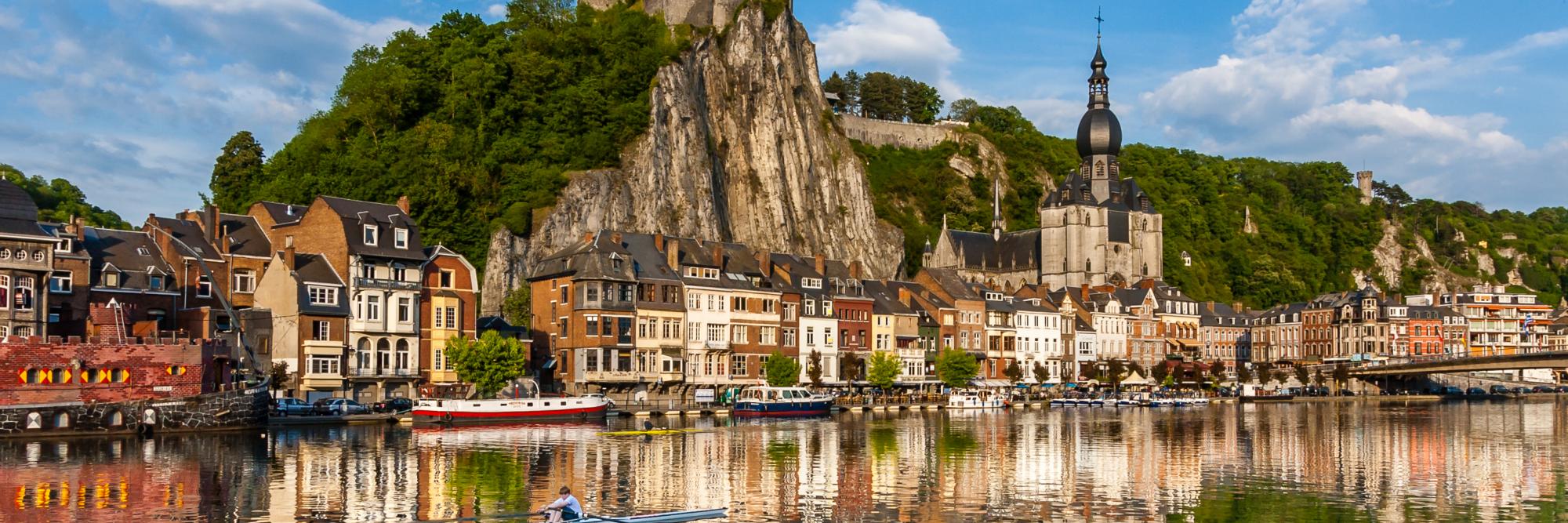 Michelle Nott is an expatriated American mother and wife with a background in education (early childhood through university level) and business (for an international company). She enjoys discovering the world through travel experiences and the innocence of her children's eyes.
Michelle Nott is an expatriated American mother and wife with a background in education (early childhood through university level) and business (for an international company). She enjoys discovering the world through travel experiences and the innocence of her children's eyes.
Read more about Belgium in the Expat Arrivals Belgium country guide or read more expat experiences in Belgium.
About Michelle
Q: Where are you originally from?
A: I grew up on the west side of Cleveland, Ohio. However, since my childhood, I have lived in France, Michigan, Virginia, California, and New Jersey before arriving in Belgium.
Q: Where are you living now?
A: I live in Chaumont-Gistoux, Belgium, which is located south of Brussels in the region of Wallonia.
Q: How long have you lived in Belgium?
A: 11 years.
Q: Did you move with a spouse/children?
A: I moved with my daughter, who was just one year old at the time, and my husband. We now have a second daughter who was born at the end of our first year as expats.
Q: Why did you move; what do you do?
A: We moved because of my husband's job.
I spent the first couple of years concentrating most of my energy on our family. I am now writing again and have a blog of children's stories entitled Good Night, Sleep Tight. I am also a freelance editor and have written for International Living Magazine and (A)Way Magazine, as well as contributing regularly to Belgian Trips.
About your city
Q: What do you enjoy most about your host city? How's the quality of life?
A: The quality of life in Belgium is exceptional, which is what I enjoy the most. Many travel writers have mentioned how good the food is in Belgium, from small lunchtime places to Michelin-star restaurants, and they are absolutely right. Of course, the fresh weekly markets and the butcher and cheese shops guarantee that good quality food is readily available to even those that prefer to cook at home. I find that the family-owned specialty stores and market stands have fabulous personal skills and make coming back every week a pleasure, a welcome change considering that customer service seemed to be a notion that was always so absent from the large chain stores found in the States.
Q: Any negatives? What do you miss most about home?
A: I cannot really state negatives, but maybe there have been challenges in looking at things from a different perspective, trying to understand how or why one manner of thinking or acting works.
At first, I missed knowing where to shop (If only there were a Wal-Mart, Staples, etc...), but no longer is that the case. When people ask me what I miss about "home," all I can answer is family and friends (ok, chocolate chip cookies and baseball, too).
I have dived head-first into this adventure and haven't really wanted to come up for air yet.
Q: Is the city safe?
A: I do feel safe, but that may be a false sense. I have heard from people, acquaintances and friends alike, of having their purses and briefcases snatched (even from inside their cars!), but that happens in every big city.
I actually live more in the country and do feel our town is very safe. A police officer once told me years ago that there had been break-ins in our neighborhood but that the thieves wanted cash and jewelry, not to hurt anyone.
Q: Which are the best places/suburbs to live in the city as an expat?
A: I actually wanted to live outside the most populated expat communities because I did not want to be surrounded by only expats. I was a French teacher up to a week before coming here, so it was a given that I preferred to live in Wallonia. I absolutely wanted to meet the locals and experience Belgium as best I could. Most of my American friends live in Waterloo or Overijse and love it. The Flemish are given to knowing English quite well, so living in Flanders is an advantage for expats who do not speak Dutch or French.
Q: What's the cost of living compared to home? What is cheap or expensive in particular?
A: Coming from New Jersey, a train ride from New York City, I can say the cost of living is so much better in Belgium! We pay less for a four-bedroom house and a huge yard than we paid for a small three-bedroom apartment with an alley kitchen and no yard in Jersey.
I also feel that anyone can eat well for cheaper here than in the US. As I mentioned, restaurants are very reasonably priced for what you get. Also, taking the time – and pleasure – to go to local markets and specialty shops can cost you less than going to a huge supermarket, not to mention how much better it all tastes!
Q: What are the locals like; do you mix mainly with other expats?
A: I immediately found a nice group of locals as soon as I arrived through a community-run playgroup. We are still friends after all these years and even after the children have started different schools. We share the same concerns for ourselves and for our families.
I do find that many Belgians tend to live in close proximity to their families, at least in my area. So, in our village, everyone knows everyone and their parents and their children. I was recognized at the bakery down the street within less than 24 hours of previously being at the pharmacy, "C'est vous, l'américaine."
In addition, I have spent two years on the board of the International Study Group, an affiliate group of the American Women's Club of Brussels. With this group, I continue to meet women from all over the globe, local residents of Belgium as well as expats.
Of course, I also have wonderful American friends whom I have met over the years at the American Women's Club and at my children's school.
Q: Was it easy meeting people and making friends?
A: I did feel it easy to make friends, or at least no harder than had I moved elsewhere in the US, because I had the huge advantage of already speaking French and feeling very comfortable doing so.
Family and children
Q: Did your spouse or partner have problems adjusting to their new home?
A: My husband grew up mainly in France to a British father and a French mother who just happened to be living in Liege (also expats) when we arrived in Belgium. So, no, there were not any major adjustments for him.
Q: Did your children settle in easily?
A: My eldest daughter was still in diapers and took in all the new sights and sounds as any baby of the same age would. My husband had always spoken French to her, so finally being really immersed in the language; it just started pouring out of her. She is perfectly bilingual.
Her sister, being born here, knows Belgium as her only home. It's interesting to see the two children temporarily adjust during our trips back to the US and discover some differences of their own... "Mommy, how does the toilet flush!?"
Q: What are the schools like? Any particular suggestions?
A: Assuming we would only be in Belgium for two to three years, we chose for our first daughter to go to the local school. The first shock is that children start their education at two and a half years old. The second is that it's a full-day program. I chose to bring my children home after lunch so that they could have a proper nap in their own bed, but I was the only one.
A parent can choose to send their child to whichever school they prefer regardless of where the family lives, which is very different from the US system. Educational philosophies can and do vary, so it is best to visit the school and meet with the principal to make sure it is a good fit for you and your child. Also, don't expect to join the PTA and be a room mother and chaperone field trips, etc.
Although most schools have some sort of parent organization, it's not the bake-sale variety found in America. When I asked one principal how she encourages parental involvement, she looked at me through squinted eyes and replied. "Well, they can... drop their kids off." (Done, next school...)
We were very happy with our local school. The teachers and principal were very kind. They were also very understanding when we decided to change schools. The only English my girls were getting was from me. In the event we would move back to the US in the coming year or two, I wanted their English to be at grade level for their ages. So, I researched schools.
Personally, I was not keen on international schools because I was afraid the children would be with only expats and not get an authentic experience of being in Belgium. Then, I found Le Verseau, located in Wavre. It is international in the sense that it follows a Belgian and British curriculum. The English classes are distinct, either for the Anglophone or the non-Anglophone students. But what also attracted me was that about half the school population is Belgian. The mixture is perfect. My children have friends from all over the world, who speak different languages, have different beliefs and customs. The fact that this is their "norm" brings about an understanding and an acceptance worth much more than any tuition.
Q: How would you rate healthcare in Belgium?
A: My first experience with healthcare in Belgium consisted of baby check-ups and prenatal consultations. I was extremely impressed by the pediatrician, whom I easily found by ringing the nearest hospital, and by my Ob/Gyn, whom a playgroup mother suggested. Even if I had not been pleased, I could have changed at any time without any hassle.
One day, when my one-year-old was throwing up so frequently I could not even get her in the car to go to her appointment, I called the hospital to postpone it a bit, and the receptionist suggested I ring my local doctor who would surely do a house call. A house call! What could be more fantastic than that?!
Honestly, I was nervous about having to have a cesarean in a foreign country. It caused enough anxiety the first time around. Had I at least been in the same country for the second one, I would have known what to expect, I thought. Very happily, all went extremely well. For anyone who has had to stand up and walk across the room on the first day following major abdominal surgery, it is good to know that a new mother can lie around with her feet up for an entire week if she wants. When the evening nurse came into my room on the day of my second baby's birth, I thought, "Oh no," and then asked, "Do I need to get up and walk now?" She looked at me like I was crazy and then told me I must be.
And finally...
Q: Is there any other advice you would like to offer new expat arrivals?
A: I would suggest that anyone coming to a new country not speaking the particular language seek any method possible to learn it. This is not an easy task for busy professionals and busy parents. But, even to be able to mutter a polite please or thank you (or can I have cash back? at the checkout) does wonders for making friends and getting through the day.
– Interviewed May 2015



